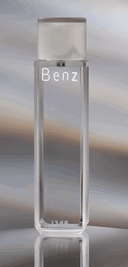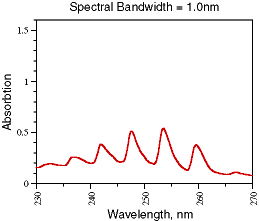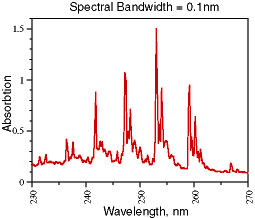
For assessing the resolution of your UV spectrophotometer

| Description | 0.1ml Benzene in a vapor state sealed in a far UV quartz cell |
|---|---|
| Primary Usage | Evaluate the spectral resolution of UV spectrophotometers |
| Useable Range | 270nm to 230nm |
| Physical Configuration | Far UV quartz cell that has been permanently sealed by heat fusion |
Product Description
View/Download Comprehensive Data Sheet for Benzene Vapor Reference
The ability of your spectrophotometer to resolve absorbtion lines is the basis of its theory of operation. If absorbtion lines can not be resolved adequately, then interfering lines will be integrated with the correct line, thus giving an inaccurate measurement.
Benzene vapor is an effective material for the detection of a defraction grating base spectrophotometer's resolving power as it has a great number of close but distinct absorbtion lines. Benzene vapor will not work well with a photodiode array spectrophotometer as they do not measure a continuum and the peaks will not be resolved well enough to be useable.
Suggestions for Use
Set your spectrophotometer to a slit width and a scan rate and make a note of the settings. Scan from 260 to 250 nm which is the area of the largest peaks. Compare the peaks to the scans below:
Lower resolution scan

Higher resolution scan

Interpertation of Results
Compare the peaks from your spectrophotometer to the two graphs shown above and determine what changes need to be made to the settings of your spectrophotometer to improve the resolution of your scan. Continue to alter both the slit width and the scan rate until you have optimized the resolution. Make a note of the settings and use them as the basis of your quality procedures. By counting the resolvable peaks from your scan you will be able to determine if the resolution of your instrument matches the specification for resolution in your instrument user handbook.
Quality program
Each time that the analysis is repeated you can compare the new results with the previous results to check for any variance. If your instrument needs service because of a change in absorbance, the historical data will greatly assist the service technician.
How to Order
| Catalog Number | Description |
|---|---|
| UR-BZ | Resolution reference cell, Benzene Vapor |
Download MSDS Sheet for Benzene Vapor Reference